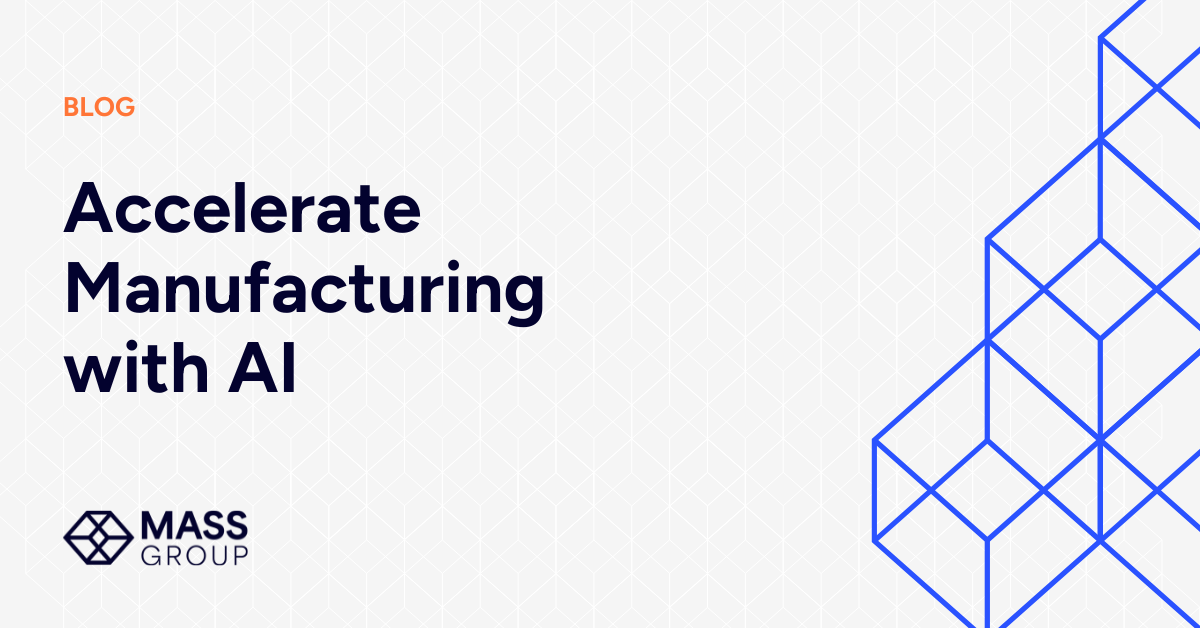
When Small- and Mid-Sized Manufacturers Put AI into Action
The market for global AI in manufacturing is on a rapid growth trajectory. Industry giants like Siemens, IBM, Intel, NVIDIA, and GE are leading the way by investing heavily in AI-powered solutions.
Small- and mid-sized manufacturers are showing an increasingly strong appetite for advanced technologies like AI. But, their ability to implement and scale these systems is often tempered by practical considerations, chiefly: budget, bandwidth, and time.
The growing availability of affordable, scalable AI solutions tailored for small- and mid-sized operations, however, is shifting this mindset.
AI Adoption in Small- and Mid-Sized Operations
With rising material costs, skills shortages, and regulatory scrutiny, manufacturers know they need to adapt.
Automation is already changing the landscape in discrete and process manufacturing. Early adopters are using advanced technology to reduce operating costs, remove bottlenecks, and improve quality control. But, the influence of artificial intelligence across the manufacturing ecosystem could be even more impactful.
Manufacturing executives share a dilemma. They need to strategize for the incorporation of a technology they know is critical to the future but may not currently understand. They want to harness AI and automation to drive operational excellence, accelerate revenue growth, and streamline customer experiences while improving compliance, sustainability, and risk management. But many factories aren’t set up—in terms of enablement or technology—to take advantage.
Fortunately, that’s changing.
Global Trends Show AI Use Is on the Rise
With the growing excitement around the ability of AI and automation to drive Industry 4.0 and new-generation Industry 5.0 initiatives, analysts are projecting a surge in adoption in the coming years.
Machine intelligence, propelled by generative AI, is anticipated to contribute between $2.6 trillion and $4.4 trillion in annual value to the global economy, of which manufacturing and supply chain productivity improvements are expected to account for nearly a quarter, according to the World Economic Forum.
In short, manufacturing is poised to become one of the largest beneficiaries of AI-driven innovation.
Companies that harness this potential of AI can expect significant gains in efficiency, cost savings, and resilience, transforming not just individual operations but entire industries. For small- and mid-sized manufacturers, this trend represents an opportunity to level the playing field, adopt cutting-edge technologies, and compete in an increasingly digital and data-driven global market.
In industries where operational efficiency and product quality are critical—semiconductors, aerospace, and defense, for example—there is a noticeable trend toward using AI to gain a competitive edge.
Small- and mid-sized manufacturers are hungry for new ways to unlock value and AI initiatives show promise. A Bain & Company survey found that 74% of organizations expect a positive ROI from their AI-driven automation initiatives. 56% say the combination of automation and AI (and machine learning) will make “the most profound impact.”
The use cases are profound.
AI-driven inventory management programs, for example, can optimize inventory levels and reduce bottlenecks. AI-powered computer vision solutions can increase quality control and inspection. And, on the factory floor, AI can analyze sensor data to predict equipment failure before it happens.
Starting and Sustaining a Long-Term Transformation
The industry is at an inflection point.
When manufacturers put AI into action, they unlock a range of benefits that can transform their operations. These transformations, however, can be complex, expensive, and time-consuming. Most factories operate with a mix of legacy systems and custom platforms. Integrating these systems with cutting-edge data science is a massive barrier.
No one said driving change is easy. But it doesn’t have to be hard.
To build the inertia for long-term transformation, small- and mid-sized manufacturers should focus on a phased implementation approach. By planning a gradual integration, organizations can reduce the impact on their existing infrastructure, reduce the risk of disruption, and build incremental successes.
Simultaneously, they must clearly define their mission objectives—not just pain points. This requires a deep understanding of the technologies, business challenges, underlying systems, benchmarks, and operations of a factory.
Understanding the impact on people, processes, and existing systems will help executives deliver faster and more scalable AI programs. Once a clear view of the objectives is made, a plan can be developed to envision what’s possible.
Building a Transformation Action Plan
AI has the power to solve some of the manufacturing industry’s toughest challenges around safety, productivity, and operational efficiency. And, it represents a pivotal step forward for small- and mid-sized manufacturers transitioning into Industry 4.0 and beyond.
While large manufacturers make headlines for pushing the boundaries of what’s possible, many small- and mid-sized companies are still in the early stages of investing in and implementing advanced technologies.
MASS Group has helped these manufacturers get started and scale innovation initiatives with its powerful manufacturing execution system (MES). This platform helps manufacturers capture essential data from all aspects of their operations so they can see a comprehensive view and achieve smarter, more connected workflows.
For organizations that see AI as a competitive advantage, MASS Group provides the essential tools and expertise to create more efficient, connected, and intelligent operations. Want to see how MASS Group can help you take your operations to the next level? Schedule a demo and explore the possibilities.


